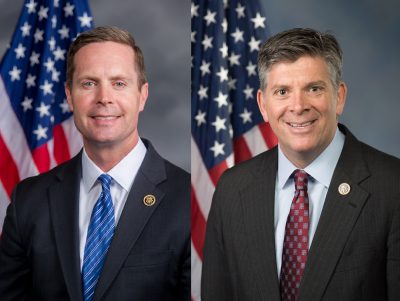Illinois is set to get an estimated $17 billion in funding as a part of the $1 trillion infrastructure bill signed by President Joe Biden yesterday. Governor J.B. Pritzker and Chicago Mayor Lori Lightfoot were among the many people on hand to witness Biden making the bill into law.
Several Democratic Congressman saw pieces of legislation they pushed in the House of Representatives make into the bill. U.S. Senator Tammy Duckworth’s provision to ensure Americans with disabilities can access rail transit, giving them more independence and access to employment by establishing a discretionary grant program to fix railway access programs. It also permanently establishes a Disability Advocate Seat on the Amtrak Board of Directors to advocate for access to their commuter rail system. The provisions also include federal Scott’s Law standards pursued by Duckworth, U.S. Senator Dick Durbin, and Congresswoman Cheri Bustos.
Two local Republican Congressmen have their qualms about the bill and the process of getting it into law.
18th District Congressman Darin LaHood says that he’s all for making investments in the nation’s hard infrastructure but he says he’s not in favor of majority-party Democrats holding bills hostage to get votes on other bills: “It focuses on hard infrastructure – roads, bridges, airports, and rail systems, rural broadband. Those are all things that I’ve supported. The bad part is two things – 1. It adds about $280 billion to the deficit over 8 years, so that goes on the backs of taxpayers. It adds to our $29 trillion that we are already in debt. Secondly, unfortunately, [House Speaker Nancy] Pelosi tied it to the reconciliation, or the tax raising bill. If she would have brought this bill up back in August when it had passed the Senate in a clean vote and not tied it to the reconciliation tax-raising bill, it probably would have passed with about 80 or 90 Republicans supporting it, but she didn’t do that. She held it hostage, and so, that’s unfortunate. It is the law of the land now. In general, as I mentioned, hard infrastructure is good for this country. I just wish the process of it would have been done differently.”
13th District Congressman Rodney Davis says he is a big fan of infrastructure investment and he thinks there are a lot of good Republican provisions in the final version. Davis says, though, the re-authorization packages that he has voted for in the past have probably invested more into hard infrastructure than what the new bill will do: “I’m pretty confident that we’ve been actually able to invest in our normal reauthorization processes, but in the pandemic relief funding bills, we actually gave on an annual basis nine times more to some of these areas of transportation modalities than what these $1.2 trillion bills are going to give to them over 5 years. So we have already invested historic amounts in our airports, in our transit system, and in other hard infrastructure before this vote came about, and there is still billions left to be spent.”
The Illinois Chamber of Commerce along with several state Democrats took the opposite approach as the two Congressmen, calling the new law a generational investment on par with the New Deal of the Roosevelt era, saying it will piggyback upon the 2019 Capital Bill signed by Governor J.B. Pritzker. The ICC also says that the broadband roll out will help secure economic investment into rural areas by giving communities fast and stable Internet connectivity.
The new federal bill is also expected to piggyback upon the most recent Illinois energy bill pushing for more reliance for more renewable forms of energy, including incentives for building electric charging infrastructure for electric vehicles along with updates to energy grids bringing on more solar and wind energy into the nation’s power grid.




